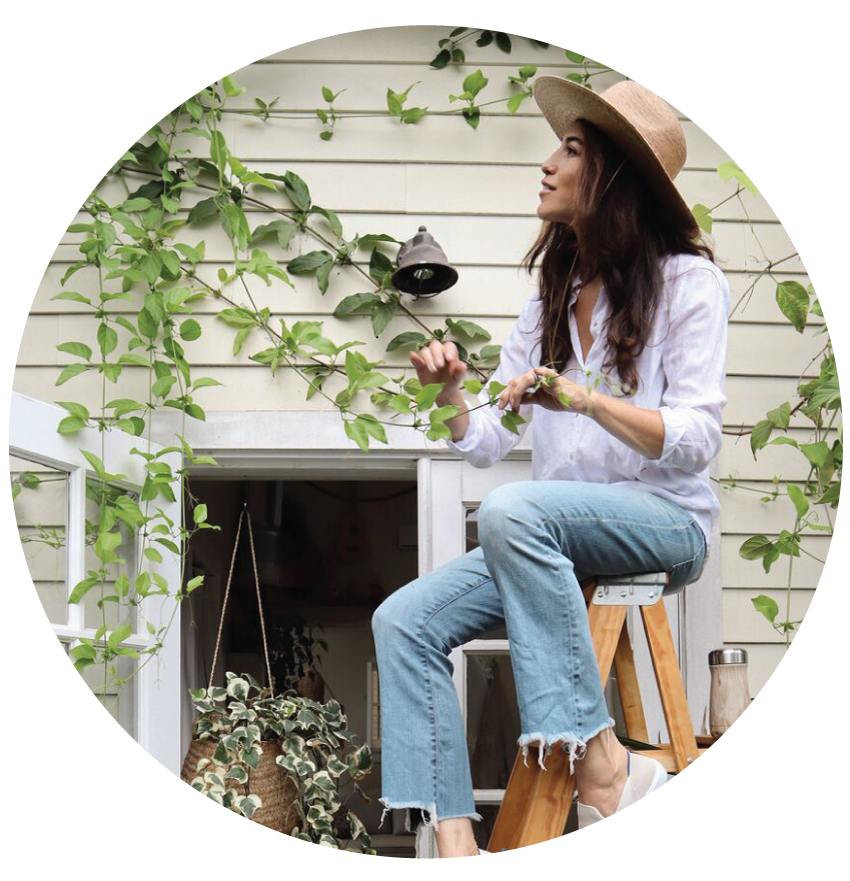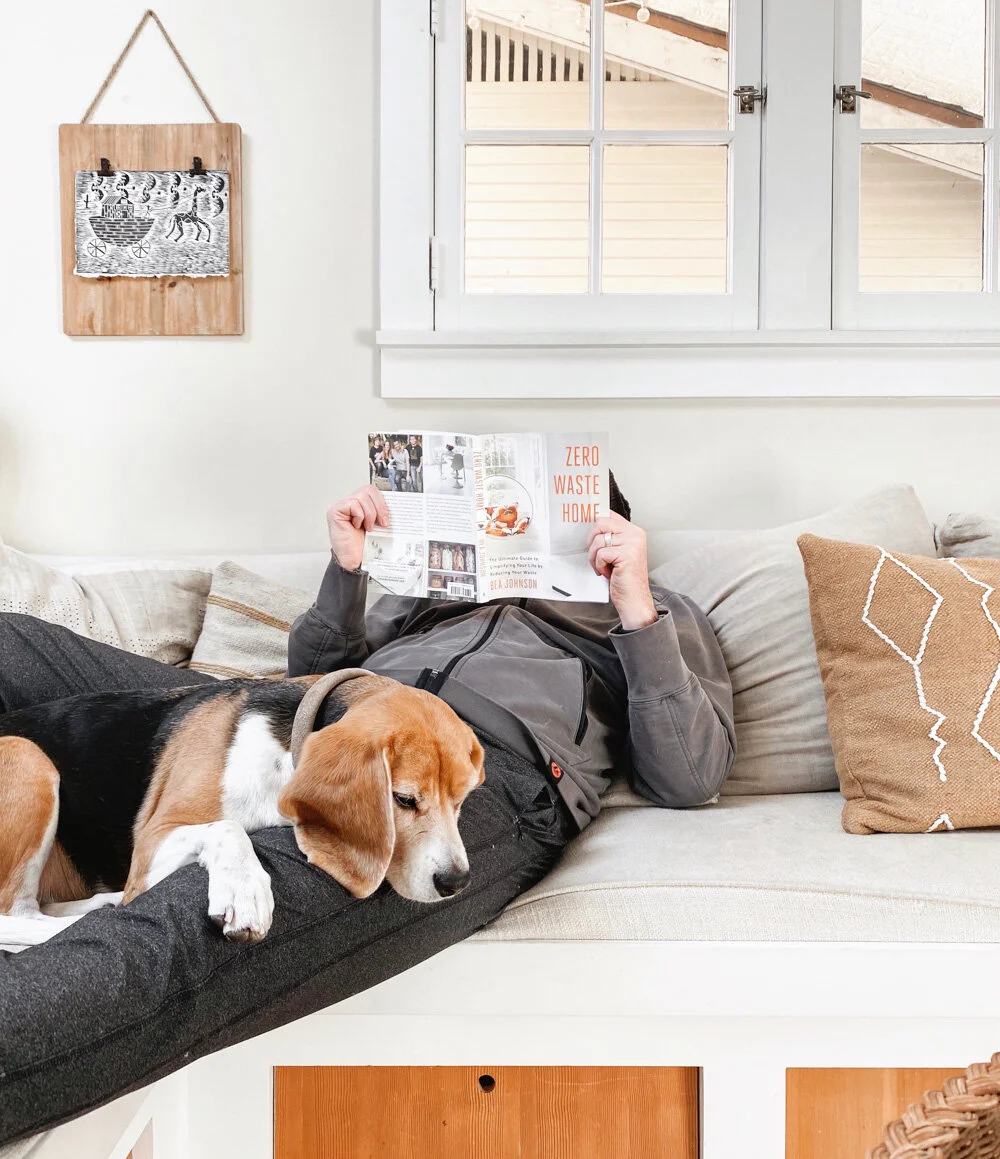Encouraging Household Shifts in Light of the Climate Crisis
I’ve long taken for granted that my husband and I are on the same page when it comes to most elements of our home and lifestyle. Since we operate in such close quarters every day and night as we both work from home, we’ve continued to learn and adapt together over all these years. So when I started educating myself more about the climate crisis and my role within it, Adam was right there by my side, literally and figuratively.
Together, we began to understand that while governments around the globe and huge corporations are doing the vast amount of damage to the planet, we still owe it to the earth, wildlife, communities who are currently suffering and being displaced, and younger generations to immediately curb our personal consumer habits.
We also realized that the most meaningful action we could possibly take is to vote for leaders and policies that operate with climate justice at the forefront, and to continue listening to, learning from, and supporting organizations and individuals who are doing meaningful work on the subject, far beyond echoing trends and buzzwords.
Several readers of this blog have written in to share that they’ve been struggling to encourage others within their household to adjust habits in light of the climate crisis. Here are some angles/approaches that we hope might help::
Avoid New Spending
The the up-front cost of some eco-friendlier alternative products can be prohibitive or discouraging, and turn folks away from lower waste living. (And many of those products are marketed as being greener, when in fact they’re problematic in certain regards.) Perhaps avoid acquiring new items, and start instead by making changes within your current budget and by using your existing belongings. For example, you don’t need new glass bottles with pre-marked tare weights to do your bulk shopping— a washed and repurposed glass jar that once held pasta, apple sauce, jelly, etc. can work just as well, and since it’s already in the waste stream it further reduces your footprint. (These jars can also be outfitted with very inexpensive spout or pump style tops to become soap dispensers, and/or they can be used with just as inexpensive beverage tops to become to-go water or coffee containers.) Similarly, you don’t need items like mesh produce bags— just skip bags altogether when in the market, or simply use larger tote bags to corral loose produce. By cutting back on new materials and using what you already have on-hand, you will keep your spending at bay while also putting your current belongings to more extended use.
Start Small (& Save)
If your family feels like what we do on an individual basis won’t make any difference so there’s no point in trying, perhaps start with small steps that require little-to-no effort and appeal instead to the narrowed scope of household energy efficiency. From unplugging appliances that aren’t in use, to taking shorter showers (and fewer baths), to bundling up when the house feels a bit cold (as opposed to cranking up the heat), to replacing burned out bulbs with energy-efficient alternatives, you can lighten your impact while reducing your utilities. When the results become apparent via your monthly bill, the effects of these tiny efforts might start to feel more tangible on a personal scale.
Appeal to Time
For a myriad of reasons, we often opt for immediate conveniences, that overlook long-term environmental inconveniences. If members of your household feel pressed for time (who doesn’t?), perhaps appeal to the angle of efficiency. While it might indeed take an extra minute in the morning to pack a bag of reusable to-go goods, and it might take a few extra seconds for a cashier to get a tare weight on a container, none of this compares to the amount of time it takes to go shopping for disposable household goods once your current ones run out. (Plus you’ll no longer have to budget for as many disposable goods, and can instead save that money to pay off debt, save for necessities, and/or use some of it to support organizations and individuals who are investing in regenerative practices for our collective future.)
Go About Your Day Your Way
As you continue to educate yourself and further adopt your own philosophy and rituals, your family will likely take notice. Presumably no amount of badgering is going to convince anyone to change their ways, and a judgmental or greener-than-thou attitude will rightfully discourage and repel more than it attracts. But if you continue to transition your own habits, others within your home could be influenced by your actions. When you start composting, repurposing food scraps for stock, repairing clothes and household items, biking or taking public transportation over driving solo when possible, and stop buying unnecessary goods, it will likely cause a ripple effect.
Be Patient
As with any lifestyle transformation, change doesn’t happen all at once. Learning healthier habits and unlearning old ones takes time, as well as trial and error. Plus new (and conflicting) information is always being presented, so we all have to keep educating ourselves and adapting together. We don’t all need to live a flawless low waste lifestyle in order to make a dent in our output and overflowing landfills, and to communicate to governments and manufacturers that the tides are turning.
Focus on Those Being Impacted Most, and Future Generations
If none of the above works, it might be helpful to remind folks of the impact our material consumption and waste has on younger/future generations and current wildlife, and to reiterate to them that the people who contribute the least to the crisis suffer the most. If the physical condition of the planet isn’t shaking your household, hopefully the paramount issue of human rights will.
Vote
Stay informed of your elections on the local and larger levels. Make sure others know when and where to vote. Show up. Cast your ballot. Give a damn. Your enthusiasm can energize and assist others.









